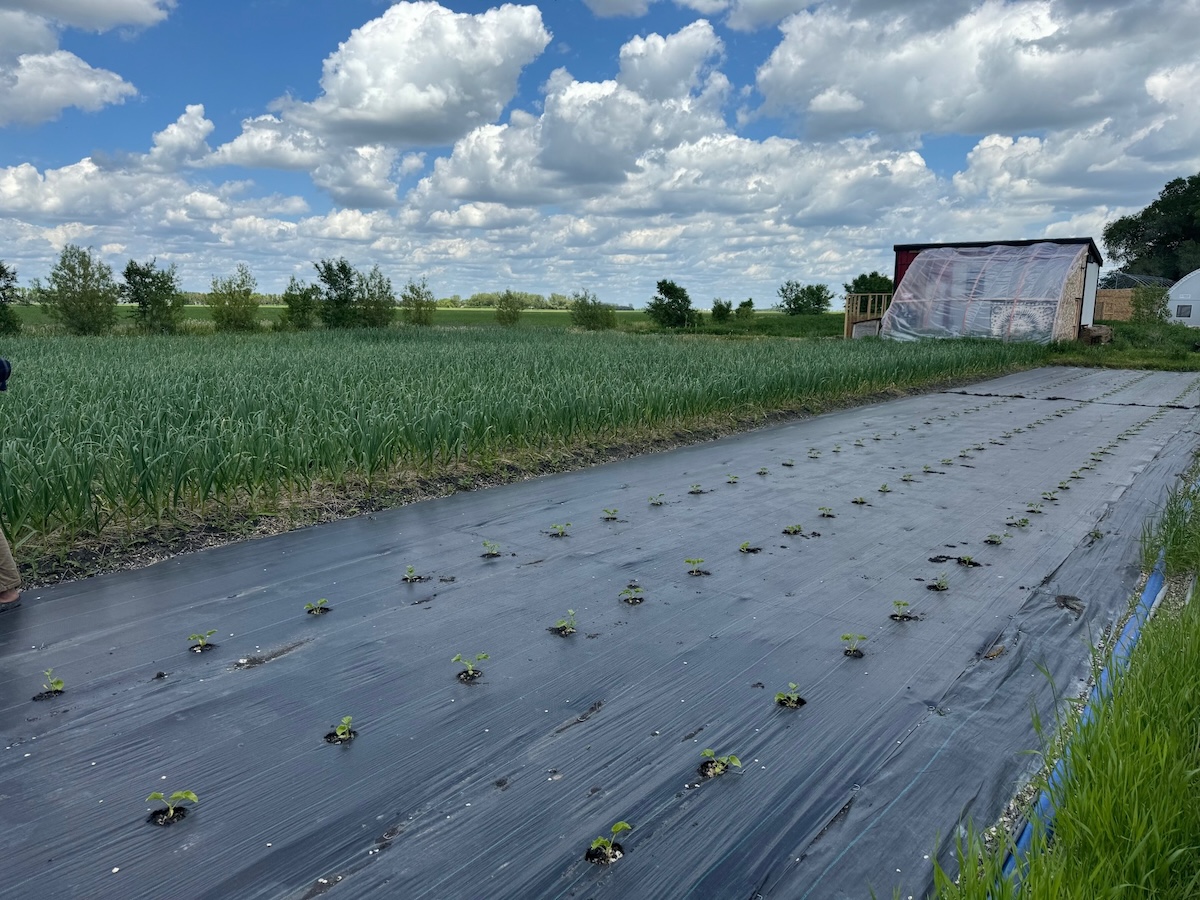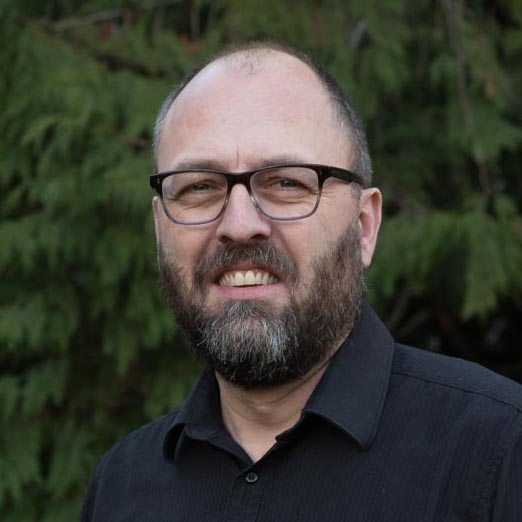Humans of the CBWC

Laurel and Kevin Auch – Award-winning farming practices in Southern Alberta
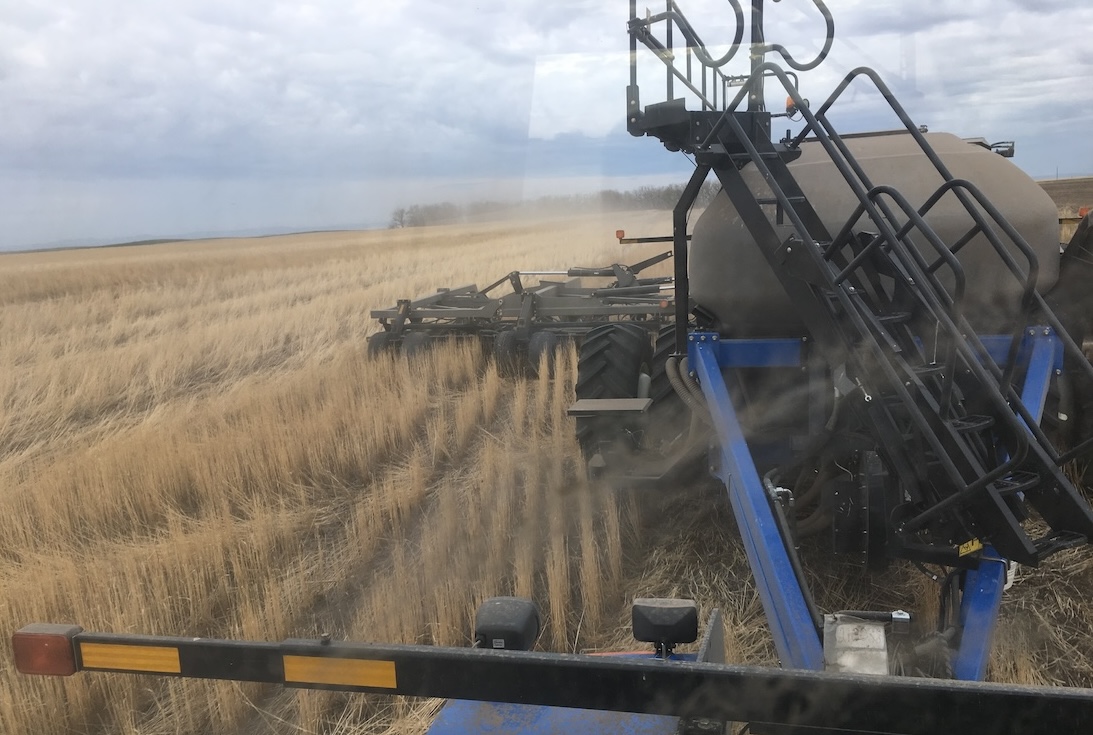
Seeding into the tall stubble preserves moisture and provides nutrients
Our farm was established in the Carmangay area of southern Alberta in 1963 when I was just a baby. My father purchased land that had experienced significant erosion over the years due to European farming practices that didn’t transfer well to some of the sensitive wind-blown southern prairie soils. Preserving and turning this land into productive farming soil has been an important goal of our farm ever since. Dad’s early efforts were dominated with growing crops more suited to our area and trying to find better ways to control weeds without burying the protective surface plant material through tillage.
In 1999, we began attending Faith Community Baptist Church in Claresholm, which was pastored by Dennis Stone at the time. As we learned more about our new-found faith, it was meaningful to see that the goal of creating productive land for our farm was part of our much bigger calling, as Christians to be good stewards of the resources given to us by God. One of a farm’s most important assets is its land, so over the years we have continued to try to learn about good farming and stewardship practices and adapt our methods accordingly. Today we grow a variety of diverse crops in rotation and build soil health by continuing to avoid tillage which disrupts its delicate ecosystem. New innovations in farm equipment also allow us to leave behind most of the plant material from the crop, which preserves moisture and nutrients. These practices have vastly increased the life and productivity of our soil.
We love the farm lifestyle and are proud to be part of the agricultural community, so it was an honour to recently receive an award to recognize our farm’s stewardship and conservation efforts. The Orville Yanke Award was created in memory of a man I got to know in the 80’s and 90’s when I was a board member of the Southern Alberta Conservation Association, which he chaired. He had a lifelong passion for soil conservation, and our farm has benefitted from his mentorship and that of others like him. None of our three children will be taking over our farm, but our goal is still to leave behind fertile, productive land so that its value for growing healthy food will continue for many generations to come.
Read the full story here, as published in the Lethbridge Herald this Spring.
FBC Vancouver–’Heart for the City’ Project
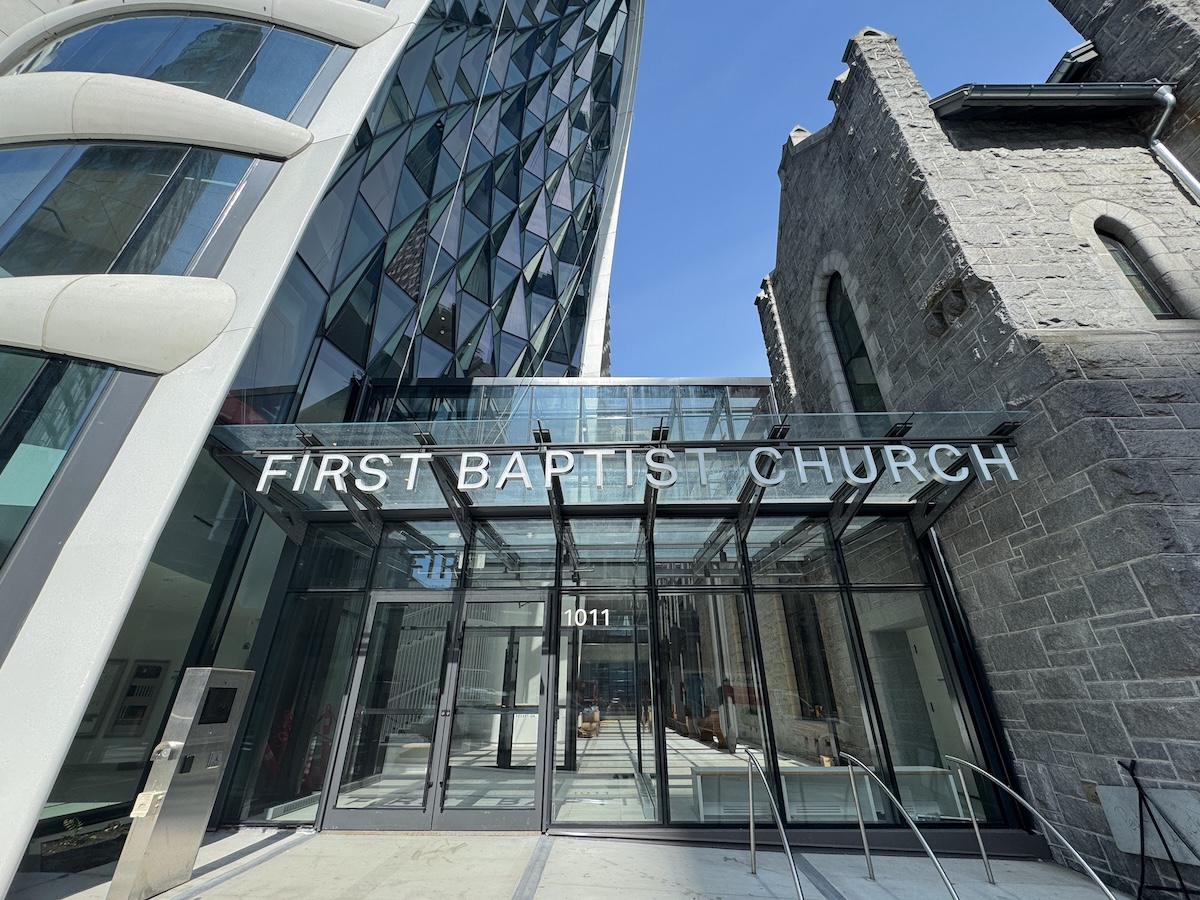
One hundred and thirty-eight years ago, on March 16, 1887, a group of Baptists gathered to found the very first Baptist church in the fledgling city of Vancouver. Naturally, they called it First Baptist Church of Vancouver. It was scarcely a year younger than the city itself, which was formally incorporated on April 6, 1886. One hundred and fourteen years ago, First Baptist Church commemorated the opening of a beautiful Gothic Revival-style church building at the corner of Nelson Street and Burrard Street in the heart of downtown Vancouver. At that time, it was the city’s largest religious building, with a sanctuary that had capacity for 900.
Fifteen years ago, First Baptist Church began dreaming about how to faithfully steward their place and resources in order to continue to participate in the work God was doing and would continue to do in Vancouver. That dreaming led to the implementation of a project called ‘Heart for the City’.

The Heart for the City (HFTC) project combined several elements of FBC’s missional vision, including a development agreement that resulted in a restoration and seismic upgrade of the church’s heritage buildings, an expansion of the church’s community and ministry space, a new 7-storey condo building and a new 57-storey tower known as The Butterfly.
The “heart” of this project was to ensure the safety and longevity of FBC’s historic building for generations to come and to meet some of the city of Vancouver’s expressed needs around housing and social services.
Through a long process of listening to representatives from the city and the community, exploring different options with the church’s neighbours and prayerful discernment, the church entered an agreement with Westbank Corp to complete the project; Westbank contracted Bing Thom Architects (now Revery Architecture) to design the project. That process was wonderfully led by Dr. Darrell Johnson (Senior Minister at FBC at the time of the project’s inception) and many others. Most recently, Pastor Justin Kim (Lead Pastor of Staff and Strategic Development at FBC), along with congregation members Steve Milos and Fred Liebich, has spearheaded the church’s side of the HFTC project.
Some key features of the HFTC project include:
- 7-storey building with 61 units; 41 units are exclusively dedicated to affordable housing, helping to address the crisis around affordability in downtown Vancouver.
- Full-time, 37-space childcare facility for infants and toddlers; this will be run in partnership with Wind & Tide, a well-regarded Christian childcare provider with over 35 years of experience. This helps to address the city’s shortage of affordable childcare and is supported by a grant from the ChildcareBC New Spaces Fund. This fund is jointly supported by provincial investments and federal funding under the 2021-2022 to 2030-2031 Canada-British Columbia Canada-wide Early Learning and Child Care Agreement.
- Expanded kitchen and purpose-built spaces for our Street Ministries program to better serve the city’s vulnerable populations.
- A counselling centre and programs to support mental health and wellness; this will be run in partnership with Burnaby Counselling Group.
- Multi-purpose spaces for ministry uses, including spaces for ESL classes, parenting workshops, day camps for children and youth, and programs for older adults and retirees.
- Refreshed and upgraded historic sanctuary with a capacity of 875, and a beautifully restored, two-storey hall for church events such as concerts, children’s productions, conferences, and other events.
- An integration of “old” and “new” architectural designs that celebrate the historic heritage of the church and draw attention to its present vitality. One of the design themes that runs throughout the whole project is the shape of organ pipes. The sanctuary pipes themselves have been cleaned and restored; the organ pipe shape is reflected in the pillars of the galleria space that connects the heritage site with the new podium site, and the shape of The Butterfly towers also evokes organ pipes.
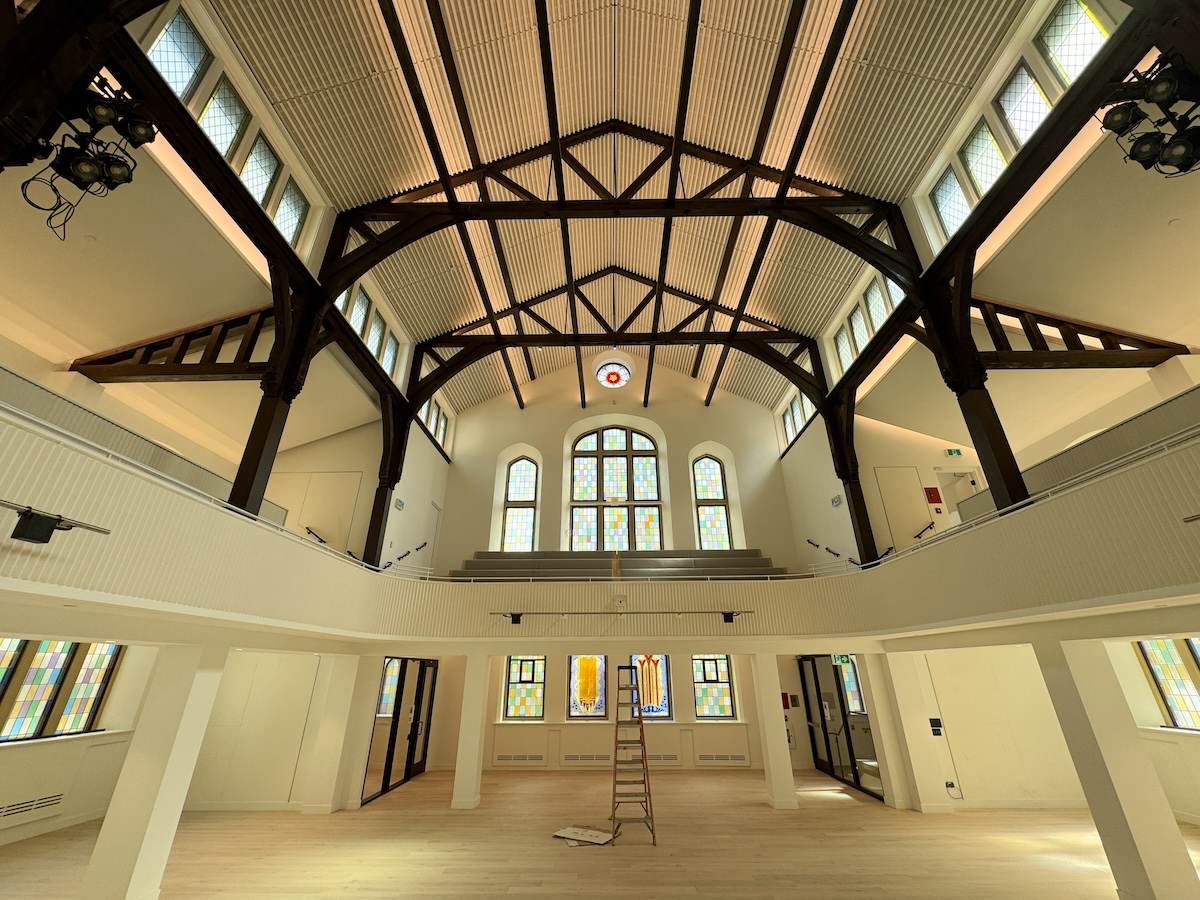
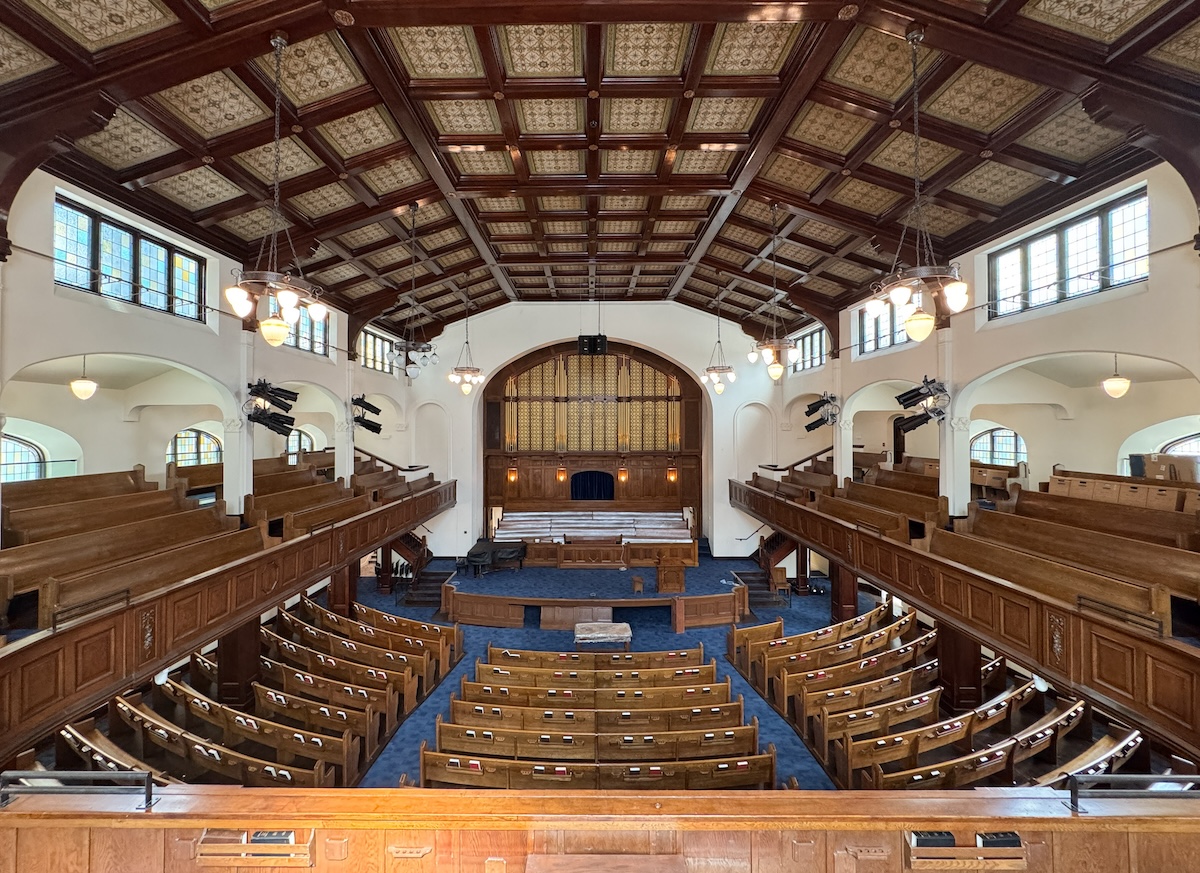
The congregation officially moved out of its building in April 2021, but the last Sunday worship service in that building was actually in March 2020 due to the global pandemic. In the past five years, FBC has worshipped and gathered in 30 different locations in downtown Vancouver and across the city.
Despite the challenges associated with this extended period of displacement, God’s grace has been evident in the resilience of the congregation, the dedication of the pastoral team and leaders, and in a renewed sense of interconnection with the community and partner organizations. There is great excitement around the re-opening of the building and the celebrations to follow.
FBC will begin holding Sunday services in its building in May, with a dedication and commissioning service set for May 25th at 2:30pm. All CBWC pastors and anyone interested, especially those in the BCY Region, are warmly invited to join the May 25th celebration.
Throughout its history, First Baptist Church has sought to be a people who proclaim the good news of Jesus Christ and work for the flourishing of the whole city. We at FBC hope and pray that the conclusion of the Heart for the City project, and the beginning of the next season in the life of the church, continues that legacy of missional presence. God has been, and still is, good!
We look forward to celebrating God’s provision and goodness throughout this season. We look forward to bearing witness to Jesus’ transforming power. We look forward to welcoming our community to come and join us as we serve Jesus in downtown Vancouver and beyond.
Drew Melton, D.Min.
Lead Pastor – Preaching and Vision
The First Baptist Church of Vancouver
drewm@firstbc.org
Between January and August this year, we are journeying through these reflections on the Lord’s Prayer, used with permission, by Carolyn Arends.
The Lord’s Prayer is the theme of our Assembly this May.
If you missed the first 3 editions you can find them in the past issues of Making Connections here.
The universe in 57 words–Part FOUR
By Carolyn Arends

PETITION TWO
Thy kingdom come . . . on earth, as it is in heaven.
If we’re going to pray “Thy kingdom come,” we’re going to need to understand what Jesus means by kingdom.
HOW JESUS DESCRIBES HIS GOSPEL
Jesus’ public ministry began with his proclamation, “Repent, for the kingdom of heaven has come near” (Matthew 4:17).
Once again, we hear Jesus using prophetic language unmistakable to the Jewish ear, signaling that he is the fulfillment of long-awaited promises. But if the kingdom “has come near” in Matthew 4, why does Jesus teach us to pray for it to come in Matthew 6? It will help us to look closely at four key words in Matthew 4:17—repent, kingdom, heaven, and near.
Repent
For any of us who grew up in the hot, scary shadows of brimstone pulpits, the command to repent causes an involuntary shudder. But the Greek word is metanoeo, which is more invitation than threat. It means “to change your mind,” or “to reconsider.”
Reconsider what? According to Jesus, everything you thought you knew about reality. Why? Because the kingdom of heaven is near.
Kingdom
A kingdom, Dallas Willard points out, is a region where a ruler has domain—the place where whatever he or she wants done, gets done. God’s kingdom, then, is “the range of his effective will”—the place where what God wants done comes to pass.
Thus, God’s kingdom is the invisible but very real realm where God reigns, and it’s characterized by love, truth, justice, goodness, and wholeness. It’s a wonderful place to be. The apostle Paul testifies that “the kingdom of God is . . . righteousness and peace and joy in the Holy Spirit” (Romans 14:17).
Heaven
While Jesus often speaks of the “kingdom of God,” in Matthew’s Gospel we find him emphasizing that this kingdom is also the “kingdom of heaven.”
Most of us think of heaven as somewhere “out there,” the place where God watches from a distance and we will one day join him. But for the biblical writers, heaven is close. The “first heavens” is a term used to describe the earth’s atmosphere. So when Jesus describes the invisible realm that God inhabits, he lets us know it’s not only “out there,” but also as near as the atmosphere surrounding our bodies. God’s kingdom is so close that “in him we live and move and have our being” (Acts 17:28).
Near
When Jesus says that the kingdom has come near, he is announcing the incredible news that God’s kingdom is now accessible in a new way. In Jesus’ first recorded words in Mark’s Gospel, he prefaces this announcement with the dramatic phrase “The time is fulfilled” (1:15). The implication is that with Christ’s earthly arrival, history has reached a crisis point. Everything has changed. The kingdom of heaven has begun to break into earthly existence like never before. As Trevor Hudson likes to say, ‘Jesus is now announcing the availability of another kind of life’.
But here’s the rub. As real and available as God’s kingdom is, there are still, for now, competing kingdoms. In fact, part of what makes us human is the fact that each one of us has a personal kingdom— “a realm,” Willard says, “that is uniquely our own, where our choice determines what happens.” We always have the option to align our little kingdoms either with God’s kingdom or with the kingdoms of this world.
That’s why, with this second petition of the Lord’s Prayer, Jesus teaches us to pray for the kingdom to come more fully into our lives, our neighbourhoods, our churches, our governments, every corner of our world—until God’s reign is as complete in us as it is in heaven. We’re asking him to supplant the competing kingdoms that operate in our individual hearts and in our collective systems. And once again, we’re asking God to do what only he can do.
There is, of course, a dissonance we sometimes feel between the peace and wholeness of God’s kingdom and the discord and death of this world. Chris Hall calls this an “Overlap of the Ages”— we live in this Present Evil Age even as we begin to participate in the Age to Come.
What should we do when we experience this dissonance— when we find ourselves “groan[ing] inwardly while we wait for adoption, the redemption of our bodies” (Romans 8:23)? According to Jesus, we should pray for the kingdom to come, trusting that God is incorporating our prayers and lives in his ongoing mission to restore and redeem all things.
Suggested song: “We Come” renovare.org/universesongs
PETITION THREE
Thy will be done . . . on earth, as it is in heaven.
The third petition that Jesus teaches us flows naturally out of the second. When we begin to see what it means for God’s kingdom to come, why wouldn’t we want the effective range of his will to extend further and further throughout the earth?
Lisa Koons, a leader in the 24/7 prayer movement, was asked how Christians could possibly pray together during a divisive political season. “We pray sweeping prayers, prayers we can agree on, while leaving the outcome to God,” Lisa answered. Even if we have very different theories about what God’s will might look like in a given situation, our hearts can be united in our desire for his will to be done.
So Jesus gives us a compact petition that can embrace every need, every longing, every complex issue, even our disparate ways of seeing the world: Thy will be done.
HOW DO WE KNOW GOD’S WILL?
Years ago, I toured as an opening act for Rich Mullins. There was something about Rich’s music that stirred up people’s deepest longings. I loved overhearing conversations at the autograph table; they often turned serious and urgent.
More than once, a fan asked Rich how to discern the will of God. Rich would listen, and then offer an unexpected perspective.
“I don’t think finding God’s plan for you has to be complicated,” he’d begin. “God’s will is that you love him with all your heart and soul and mind, and also that you love your neighbor as your self. Get busy with that, and then, if God wants you to do something unusual, he’ll take care of it. Say, for example, he wants you to go to Egypt.” Rich would pause for a moment before flashing his trademark grin. “If that’s the case, he’ll provide eleven jealous brothers and they’ll sell you into slavery.”
When I find myself wrestling with life decisions, I think of Rich’s Egypt Principle. It makes me laugh, and then it asks me to get down to the serious business of determining which of my options allows me to best love God and other people. Such an approach reminds me, once again, that my life with God is personal but never private. It usually rules out certain possibilities, while affirming—even creating—several others.
Sometimes, once I’ve narrowed down my alternatives in light of the Great Commandment to love God and other people, the determinative “jealous brothers” do show up. A scholarship comes through at one school and not another. A job offer is escalated or rescinded. Other times, however, I’m left standing at the junction of several seemingly reasonable pathways, miserable with uncertainty. If only Rich were around to dispatch further wisdom!
It’s when I reach those loggerheads that I am once again grateful for the passive, imperative verbs Jesus teaches us. Ultimately, the third petition is much less “Tell me your will so I can do it” than it is “Please do your will in me.”
What’s more, as helpful as this prayer is when I don’t know what to do, it’s even more essential when I do know what God is asking of me, but I’m unable to align my will with his. “Even when you can’t be willing to do what God is asking,” a friend often reminds me, “you can be willing to be willing.” The third petition invites me to move from a position of willfulness to willingness, giving God an opening to begin to complete his will in me in the way only he can.
HOW DO WE LIVE GOD’S WILL?
The Jesus who teaches us to pray the third petition is, of course, its perfect model. “My food,” he once told his disciples, “is to do the will of him who sent me and to complete his work” (John 4:34).
It’s worth noting that Jesus’ way of doing his Father’s will often seemed to defy productivity models and baffle his disciples. He seldom took the fastest way anywhere, preferring circuitous routes that gave him more time on the road with his friends. He was eminently interruptible, particularly by children and outcasts. And he had a tendency to slip away at seemingly inopportune moments to pray.
It’s a tragedy, Eugene Peterson used to say, when we end up doing “Jesus things” in a way that Jesus would never do them. More than once I’ve participated in an evangelistic event where the behind-the-scenes volunteers were treated like cogs in a machine. We’ve all seen debates over right doctrine turn ugly. And I wince when I remember the times I let my graduate studies in theology—a path on which I was clear Jesus was leading me— turn into an obsessive quest for grades at the expense of time with my family.
So as we pray this third petition, it’s important to remember we are asking for God’s will to be done not only in what we do, but also in how we do it. We’re asking the Holy Spirit to teach us how to do Jesus things in the Jesus way.
Suggested song: “Father, Thy Will Be Done” renovare.org/universesongs
To download the full resource: https://renovare.org/books/the-universe-in-57-words
Excerpts used with permission from a book entitled
the universe
in 57 words
SEVEN DAYS INSIDE THE LORD’S PRAYER
By Carolyn Arends
This resource has been influenced by more authors, preachers, teachers, and fellow pray-ers than I can credit or even remember. But I am particularly indebted to the following works: Fifty-Seven Words That Change the World, by Darrell Johnson; The Lord and His Prayer, by N. T. Wright; The Divine Conspiracy, by Dallas Willard; Prayer, by Richard Foster; and Eugene Peterson’s “Jesus and Prayer” lectures for SPIR 604 at Regent College.
Ministry Partner–Carey Theological College

Carey’s Administrative Board with President Colin Godwin at the Groundbreaking
Carey’s Timothy Hall Nearing Completion
Carey Theological College’s second Christian student residence building at the University of British Columbia is nearly ready to welcome students home.
“We are nearing the completion of Carey’s 104-bed building project, Timothy Hall—a milestone made possible by the dedication of our entire community,” says Danielle Ma, Carey’s Administrative Assistant (Design, Marketing & Communications). “From generous donors who placed their trust in us, to staff who worked tirelessly, construction teams who persevered, and the countless prayers that supported us along the way, this achievement is the culmination of collective effort.”
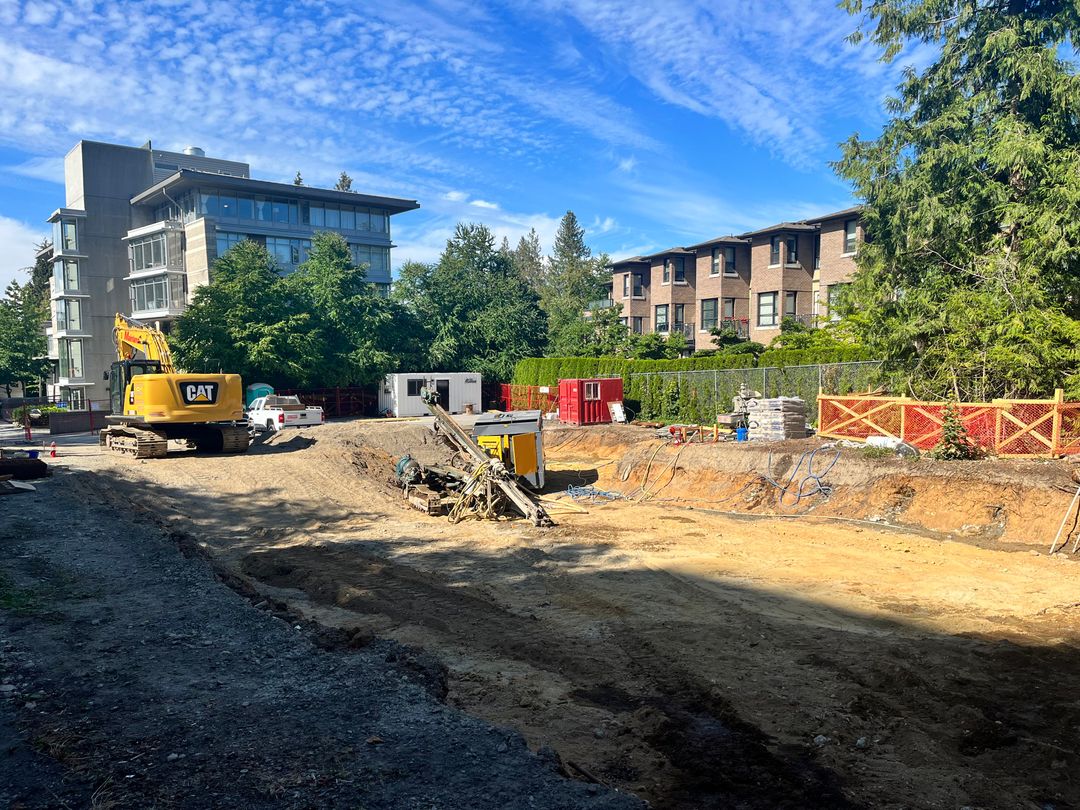
Construction, October 2023
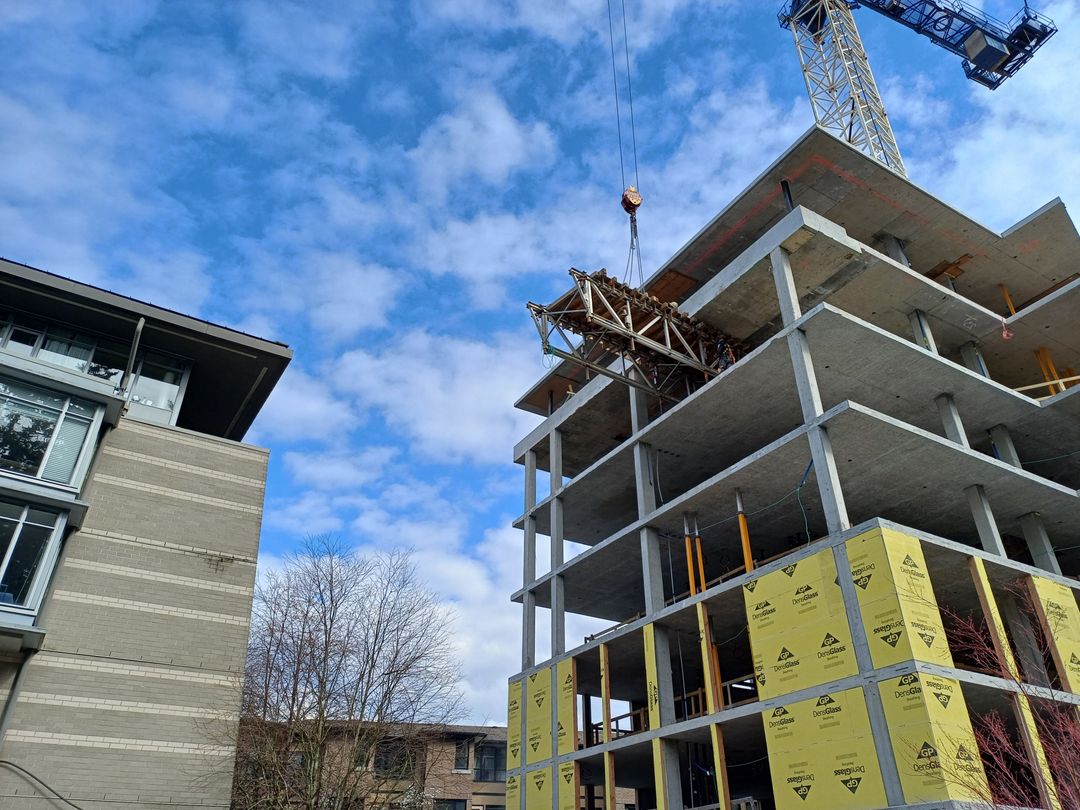
May 2024

October 2024
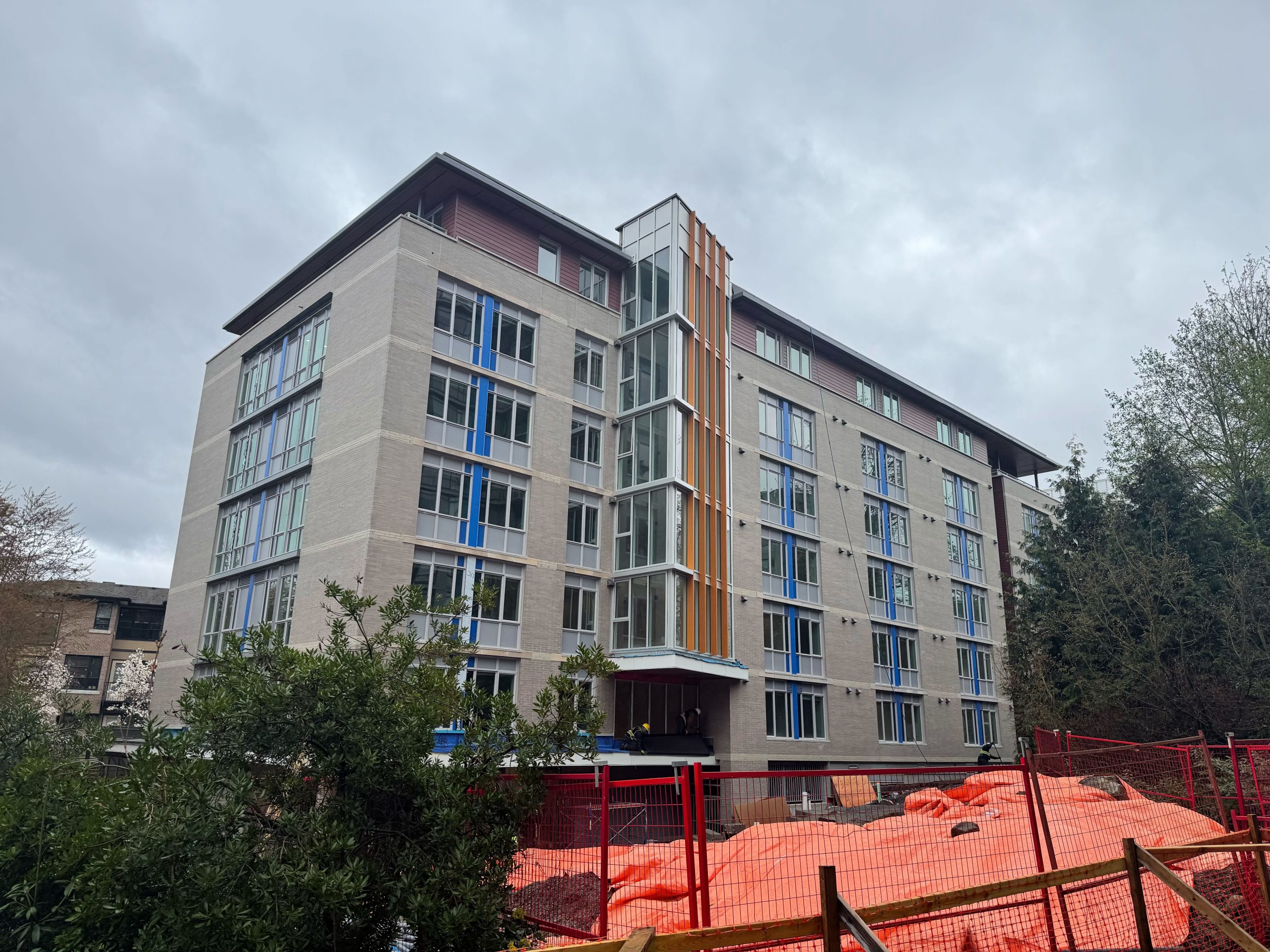
Timothy Hall as of April 2025
The new building will accommodate 104 additional students and offer a range of suites from studios to three-bedroom apartments, along with thoughtfully designed shared amenity spaces.
Find out more about Timothy Hall here: https://www.carey-edu.ca/ubc-student-residence#Timothy-Hall
Heart Smart HR
Creating a Safe Environment for Those Who Serve and Work in Your Church

It may seem unfathomable that, as Christ followers, churches could be unsafe places to work and volunteer—especially since Jesus’ command to “love one another as He has loved us” is central to our faith. Yet sadly, every-so-often, we will hear a story from a pastor or volunteer of mistreatment or bullying in their church setting.
Churches, like other organizations, should have antiharassment/bullying policies in place to help protect both staff and volunteers from abusive behavior. Some reasons why these policies are important for churches are:
1) they cultivate a safe and respectful environment and ensure everyone feels valued as individuals created in God’s image; 2) they address informal power dynamics: and 3) they speak to legal requirements—churches, as employers, are required to provide a safe work environment, and antiharassment policies help accomplish this.
Employers are required to update their workplace harassment policies and procedures to clearly set out:
- how incidents or complaints of workplace harassment will be investigated and dealt with;
- the measures and procedures for workers to report incidents of workplace harassment to a person other than the employer or manager/supervisor, if that individual is the alleged harasser;
- how information obtained in the course of the investigation will not be disclosed, unless disclosure is necessary for the purposes of investigating or taking corrective steps with respect to the incident or complaint; and
- how a worker who has allegedly experienced workplace harassment, as well as the alleged harasser will be informed of the results of the investigation and of any corrective action to be taken.
These policies must be posted in a conspicuous place in the workplace and must be reviewed annually.
While this may all seem obvious, churches are a melting pot of personalities, ethnicities and generational divides, and it is important that volunteers feel safe and supported. The Canadian Centre for Christian Charities (CCCC), in an article about motivating and caring for volunteers, shares some insights from Ruth Esau, former pastor at Centre Street Church Calgary and Founder and President of Inspired to Lead. Ruth encourages churches, when working with volunteers, to:
- Value people more than task: Each person has intrinsic value, regardless of abilities, for we have all been made in God’s image. Why do we so often treat volunteers as a means to an end? Valuing people for who they are more than for what they can do for us is a foundational, biblical principle.
- Develop a process that loves and equips people: If churches just hand volunteers a task and don’t take the time to equip them well, the volunteer may feel abandoned and ineffective. Leaders may find themselves checking up on their work because they feel they can’t trust them to do it themselves, when the real issue is poor training and leadership. Mistrust almost always leads to conflict.
- Ensure volunteers are serving in community: Serving in community helps volunteers think beyond themselves and experience the multiplied accomplishments that teamwork brings. Volunteers need to know they are part of a team and not serving alone.
- Put more into your volunteers than you take out: A great starting point for this is to regularly affirm them for who they are and not just appreciate them for what they do. When leadership culture in an organization becomes focused on serving volunteers and pouring into their lives, they (the volunteers) will be the ones who catch the vision and accomplish the mission.
In addition to these practical methods of caring for, protecting, and inspiring your volunteers to the mission of your church, you might want to consider drafting a Community Covenant Policy. This type of policy clearly lays out guidelines expected for all staff and volunteers. It is a commitment with each other, before God, to live and work in a manner worthy of the calling received from Jesus Christ so that—working together in community—you may fulfill His purposes for your ministry. A sample Community Covenant Policy is provided for members by the CCCC on their website.
When churches are committed to creating and maintaining a respectful and safe environment for all who serve, work, and worship, congregations come alive, people grow deeper in their faith, and Christian witness in the community is strengthened.
“It is absolutely clear that God has called you to a free life. Just make sure that you don’t use this freedom as an excuse to do whatever you want to do and destroy your freedom. Rather, use your freedom to serve one another in love; that’s how freedom grows. For everything we know about God’s Word is summed up in a single sentence: Love others as you love yourself. That’s an act of true freedom.” –– Galatians 5:13-14 NLT
Copyright © 2025 Canadian Baptists of Western Canada, All rights reserved.
Making Connections is the monthly newsletter of the CBWC.

